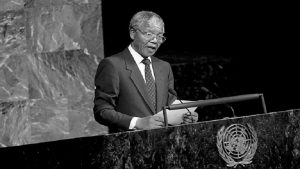Trade union, Solidarity has described a settlement agreement with Government on the Employment Equity Act as groundbreaking.
Solidarity launched the dispute against the Department of Employment and Labour with the International Labour Organisation (ILO) to challenge the constitutionality of South Africa’s new BEE and transformation laws.
South Africa forms part of the ILO member states and saw the Commission for Conciliation, Mediation and Arbitration (CCMA) roped in to facilitate the labour dispute.
Solidarity’s Dirk Herman says, “Our view is that the government has a legitimate aim to promote the interests of unemployed and poor people, most of whom are black that the outcome of the decades long current policies where race is a factor on decisions has not produced the desired effect so we believe that equality and the request for it is very important that is why we support the ILO and the UN Committee in the elimination of racial discrimination.”
The union argued that the latest amendments to the Employment Equity Act are contrary to the international labour conventions, accusing the government of being in contempt of such conventions as well as the country’s constitution.
Government, Solidarity reach agreement on Employment Equity Act
South Africa is signatory to the ILO – an organisation under the United Nations – which is devoted to promoting social justice and internationally recognised human and labour rights, pursuing its founding mission that labour peace is essential to prosperity.
The CCMA was roped in by the ILO to facilitate the dispute between government and trade union Solidarity over the new Employment Equity law.
Solidarity maintained that in its current form, the draft regulation was racially rigid and flouted convention triple-one of the international labour law.
ILO South Africa Director Dr Joni Musabayana says, “The ILO is experimenting and innovating with disputes being addressed at national level. Solidarity raised a dispute related to convention on equality and non-discrimination, the dispute was received and placed before the country the possibility to get the dispute resolved at country level. CCMA facilitated the matter and It has reached a successful resolution.”
The draft employment equity act experienced strong resistance from some sections of the population and political parties for months that labelled it to be in violation of the constitution.
The Solidarity matter sat for about 6 months facilitated by the CCMA Director Advocate Cameron Mogajane, who says, “We had to sit down with both parties and try to understand what the ILO convention means and test it against our laws particularly the Employment Equity Act and we were greatly assisted by Solidarity to explain for example the term nuanced approach on how we look at the Employment Equity Act, the issue of race. What is important is that as much as race is important we must balance all races as well.”
Solidarity presented its case on its concerns and now believes a case has been made for employment equity to be encompassing and to take a nuanced approach that will take companies needs and the issue of racial balance into consideration.
Solidarity Chairperson Dirk Hermann says, “The fact that the government and Solidarity reached an agreement on race is a breakthrough for South Africa that one can reach agreement via dialogue instead of litigation…”
“This specific agreement brings certainty to employers. Up to now there was a lot of uncertainty around what can they do, what can’t they do, how far can you go if you want to measure yourself against the national racial demographics and this brings clarity for every employer. This agreement will be part of regulations and made an order of court, says Hermann.
Thulas Nxesi explains the Employment Equity Amendment Act:
The aim of the act is to address transformation at the workplace by ensuring that all individuals participate fully and equally in the job opportunities. This is mainly because the pace of progress on transformation has been painfully slow. A settlement has been reached with the parties signing an agreement that will put to an end their dispute around the labour employment Act.
The minister explains what the agreement means for the Employment Equity draft regulation
Employment And Labour Minister Thulas Nxesi says, “The issue raised by Solidarity was that of race where they felt very strongly that the Employment Equity Act the white people were being discriminated and out of those discussions we’ve been able to explain what we are talking about that employment equity affects those who were disadvantaged before but it doesn’t mean that the white people are going to be removed in order to make space for the disadvantaged group. No that would be illegal, we were able to go through the clarifications that it must be in line with the constitution. Our own constitution doesn’t agree with discrimination.
The parties say the signed settlement agreement should lead to real change and a more responsible behaviour from companies in ensuring maximum participation of every citizen in South Africa’s economy.
There are however concerns that the agreement may result in a watered-down version of the Employment Equity Act.
The signed agreement will now form part of the public submissions around the Employment Equity Act’s Draft regulations with the consolidated submissions expected to be taken to the president in September or October.
The CCMA is convinced that South Africa’s approach to employment equity is now in line with international law and hopes this agreement will quell racial tensions and fears of exclusions.
Solidarity up in arms over amended Employment Equity Act:






